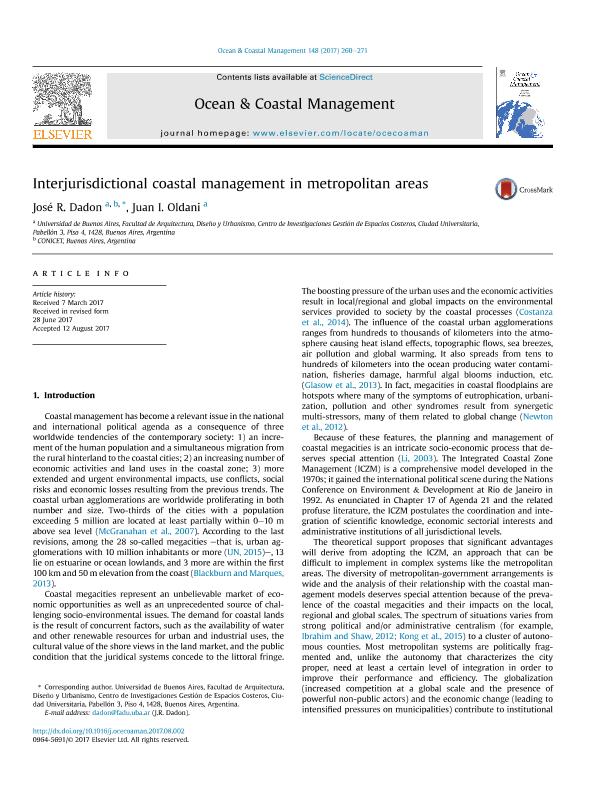Mostrar el registro sencillo del ítem
dc.contributor.author
Dadon, Jose Roberto

dc.contributor.author
Oldani, Juan Ignacio Angel

dc.date.available
2019-03-20T17:58:27Z
dc.date.issued
2017-11
dc.identifier.citation
Dadon, Jose Roberto; Oldani, Juan Ignacio Angel; Interjurisdictional coastal management in metropolitan areas; Elsevier; Ocean & Coastal Management; 148; 11-2017; 260-271
dc.identifier.issn
0964-5691
dc.identifier.uri
http://hdl.handle.net/11336/72116
dc.description.abstract
Coastal management requires intersectorial and interjurisdictional coordination but this approach can be difficult to implement in complex systems like the metropolitan areas. This paper deals with the different ways of understanding coastal management as influenced by viewpoints fed through political agendas in administratively fragmented coastal systems. The case of study is the Buenos Aires megacity (Argentina), a conurbation of 12.8 million inhabitants. We analyzed the population growth, the land uses, the economic activities, the urban waterfronts, the natural landscape protection, the intervention instruments, the public involvement, the legislation and the interboundary cooperation in the ten jurisdictions superimposed in the coastal zone during the 1970 - 2015 period. The results showed that the coastal development was conditioned by the dichotomies metropolization/decentralization and nationalization/privatization in the political arena. The implemented ICZM initiatives were ephemeral or unsuccessful due to the absence of specific policies and financial incentives recognizing the coast as clearly differentiated from the hinterland. The metropolitan coastal fringe has been managed as an empty space for urbanization under a vision pushed by the real estate interests, the main intervention tool being the local-oriented urban project. The decentralization, as opposed to the interjurisdictional integration, derived in a sectorial, uncoordinated coastal management with strong dependence on external financial sources and diminished capacity for dealing with the long-term transjurisdictional environmental problems like chronic pollution and recurrent flooding. Agreements shifting towards an integrated coastal zone management model seem to be the only way to reach a sustainable, high quality coastal development. Future studies of megacities under different institutional systems will provide data to contrast the performance of other metropolitan coastal management models.**HIGHLIGHTS* This is the first research paper on interjurisdictional coastal management in a megacity.* Fragmented governance, decentralization cycles and a lack of specific coastal policies characterized the management model.* Habitat artificialization, loss of ecosystem services and land privatization were fueled by the real estate interests.* Large-scale socio-environmental problems became chronic and will persist until an ICZM approach is implemented.* The conclusions are relevant to coastal metropolitan systems, particularly in developing countries.
dc.format
application/pdf
dc.language.iso
eng
dc.publisher
Elsevier

dc.rights
info:eu-repo/semantics/openAccess
dc.rights.uri
https://creativecommons.org/licenses/by-nc-sa/2.5/ar/
dc.subject
Integrated Coastal Zone Management
dc.subject
Urban Development
dc.subject
Environmental Impacts
dc.subject
Coastal Use Conflicts
dc.subject
Metropolitan Governance
dc.subject
Buenos Aires
dc.subject.classification
Ciencias Medioambientales

dc.subject.classification
Geografía Económica y Social

dc.subject.classification
CIENCIAS SOCIALES

dc.title
Interjurisdictional coastal management in metropolitan areas
dc.type
info:eu-repo/semantics/article
dc.type
info:ar-repo/semantics/artículo
dc.type
info:eu-repo/semantics/publishedVersion
dc.date.updated
2019-03-20T13:28:27Z
dc.journal.volume
148
dc.journal.pagination
260-271
dc.journal.pais
Países Bajos

dc.journal.ciudad
Amsterdam
dc.description.fil
Fil: Dadon, Jose Roberto. Consejo Nacional de Investigaciones Científicas y Técnicas; Argentina. Universidad de Buenos Aires. Facultad de Arquitectura, Diseño y Urbanismo. Centro de Investigaciones Gestión de Espacios Costeros; Argentina
dc.description.fil
Fil: Oldani, Juan Ignacio Angel. Universidad de Buenos Aires. Facultad de Arquitectura, Diseño y Urbanismo. Centro de Investigaciones Gestión de Espacios Costeros; Argentina
dc.journal.title
Ocean & Coastal Management

dc.relation.alternativeid
info:eu-repo/semantics/altIdentifier/url/https://www.sciencedirect.com/science/article/pii/S0964569117302272
dc.relation.alternativeid
info:eu-repo/semantics/altIdentifier/doi/https://dx.doi.org/10.1016/j.ocecoaman.2017.08.002
Archivos asociados
